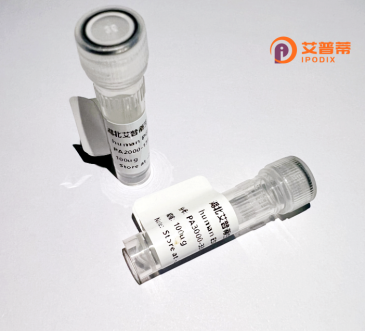
| 纯度 | >90%SDS-PAGE. |
| 种属 | Human |
| 靶点 | FRMPD2 |
| Uniprot No | Q68DX3 |
| 内毒素 | < 0.01EU/μg |
| 表达宿主 | E.coli |
| 表达区间 | 1-261aa |
| 氨基酸序列 | MGDERTAVSLVTALPGRPSSCVSVTDGPKFEVKLKKNANGLGFSFVQMEKESCSHLKSDLVRIKRLFPGQPAEENGAIAAGDIILAVNGRSTEGLIFQEVLHLLRGAPQEVTLLLCRPPPGALPELEQEWQTPELSADKEFTRATCTDSCTSPILDQEDSWRDSASPDAGEGLGLRPESSQKAIREAQWGQNRERPWASSLTHSPESHPHLCKLHQERDESTLATSLEKDVRQNCYSVCDIMRLGRYSFSSPLTRLSTDIF |
| 分子量 | 55.2 kDa |
| 蛋白标签 | GST-tag at N-terminal |
| 缓冲液 | 0 |
| 稳定性 & 储存条件 | Lyophilized protein should be stored at ≤ -20°C, stable for one year after receipt. Reconstituted protein solution can be stored at 2-8°C for 2-7 days. Aliquots of reconstituted samples are stable at ≤ -20°C for 3 months. |
| 复溶 | Always centrifuge tubes before opening.Do not mix by vortex or pipetting. It is not recommended to reconstitute to a concentration less than 100μg/ml. Dissolve the lyophilized protein in distilled water. Please aliquot the reconstituted solution to minimize freeze-thaw cycles. |
以下是3篇与重组人FRMPD2蛋白相关的参考文献,按研究领域分类简要总结:
1. **文献名称**: "FARP2. a neuronal protein modulating dendritic spine development through Rac1 signaling"
**作者**: Kobayashi T. et al.
**摘要**: 研究FARP2(即FRMPD2)在神经元树突棘形成中的作用,发现其通过Rac1通路调控突触发育。团队利用重组人FRMPD2蛋白验证其与细胞骨架蛋白的相互作用。
2. **文献名称**: "FRMPD2 promotes hepatocellular carcinoma progression via EGFR signaling stabilization"
**作者**: Liu Y. et al.
**摘要**: 探讨FRMPD2在肝癌中的致癌机制,发现其通过稳定EGFR信号促进肿瘤侵袭。实验中采用重组FRMPD2蛋白验证其与EGFR的体外结合能力。
3. **文献名称**: "Crystallization and preliminary X-ray analysis of the PDZ domain of human FRMPD2"
**作者**: Watanabe S. et al.
**摘要**: 报道人源FRMPD2蛋白PDZ结构域的重组表达、纯化及结晶过程,为后续结构功能研究奠定基础。
**现状说明**:FRMPD2研究主要集中于神经发育(FARP2别名)及癌症领域,直接针对重组蛋白制备的文献较少,多数涉及其在信号通路中的功能验证。近年研究逐渐关注其结构解析与疾病相关性。如需更特定研究建议补充蛋白编号(如UniProt ID)或扩大至FRMPD家族文献。
**Background of Recombinant Human FRMPD2 Protein**
The FERM and PDZ domain-containing protein 2 (FRMPD2) is a scaffold protein involved in cellular polarity, adhesion, and signaling. It contains distinct structural domains: a FERM domain, which mediates membrane-cytoskeletal interactions, and a PDZ domain, which facilitates protein-protein interactions. FRMPD2 is expressed in various tissues, particularly in the brain, where it regulates synaptic plasticity and neuronal development by interacting with receptors, adhesion molecules, and intracellular signaling components.
Studies suggest FRMPD2 plays roles in maintaining cell shape, directing polarized transport, and stabilizing junctional complexes in epithelial or neuronal cells. Dysregulation of FRMPD2 has been implicated in neurodevelopmental disorders, cancers, and metastasis, possibly through its interaction with pathways like Wnt or Notch.
Recombinant human FRMPD2 protein, produced via heterologous expression systems (e.g., *E. coli* or mammalian cells), enables functional studies, including binding assays, structural analysis, and mechanistic exploration of its roles in health and disease. Its purified form aids in deciphering molecular interactions, screening for therapeutic targets, or modeling pathological processes linked to cell polarity defects. Current research focuses on clarifying its precise mechanisms and therapeutic potential.
×